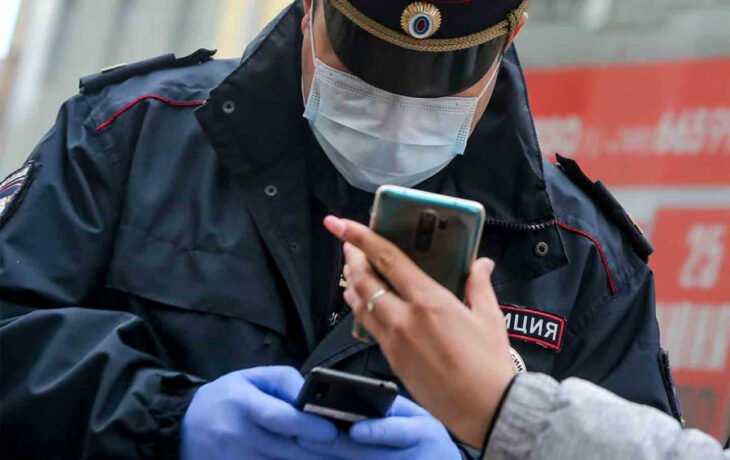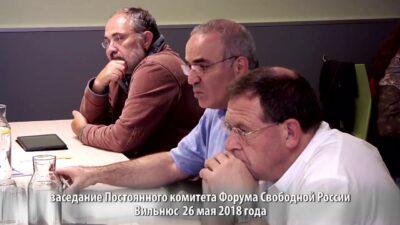Now Muscovites are being forced to use QR codes as travel permits. By Alec Luhn Moscow, Russia—The number of passengers on Moscow’s subway has dropped…

Now Muscovites are being forced to use QR codes as travel permits.
By Alec Luhn
Moscow, Russia—The number of passengers on Moscow’s subway has dropped by 80 percent since the city told residents to stay at home late last month. So would-be riders approaching many of the city’s 275 stations on Wednesday were shocked to find half-hour lines stretching out onto the street.
Rather than social distancing, the launch of the city’s Covid-19 permit system has resulted in crowding. Passengers crowded together in entrances and underground passageways as pairs of police officers scanned the QR codes that are now necessary for all trips by car or transport.
Meanwhile, ambulances were getting stuck in the giant traffic jams created by police checking drivers’ codes.
The well-known caricaturist Sergey Elkin quickly drew up a cartoon of Muscovites waiting in line to receive coronavirus particles from the hands of Mayor Sergei Sobyanin.
“They need to spread people out, have an organizer oversee the line so there would be two meters between each person, not just stand one after another breathing down each other’s necks,” accountant Yelena Fomina told me. While there had only been about 10 people in line at her subway stop this morning, she complained that the police came in close contact with every person as they scanned the QR codes.
After the morning rush hour was over, Sobyanin declared that the “lines have been eliminated.” The city transportation department later promised to develop a method to check permits through passengers’ subway cards. Yet the disastrous start to the permit system was characteristic of Russia’s uneven response to the pandemic, and indeed its increasingly authoritarian system of governance as a whole. The measures it has adopted are far-reaching, yet often tragically misguided and too late.
The country may be able to avoid the spectacularly catastrophic spread seen in the United States, but some say it should be doing better since it has had the American, British, and Italian outbreaks to learn from. Friday brought another daily record of new infections, raising the official number of cases to 32,008, with 273 deaths. Given problems with the availability and efficacy of the Russian coronavirus test, the actual number is almost certainly far higher.
“We need real figures, real forecasts, a real understanding of the situation and an honest conversation with the people,” Darya Besedina, a liberal activist who was elected to Moscow’s city council amid widespread protests last year, told me. “There needs to be a high percentage of trust between people and the authorities to get through this kind of crisis. Communication is more important than batons and bans.”
Russia closed its land border with China back in January. But it was slower to react to the growing crisis elsewhere, introducing a mandatory two-week quarantine for travelers arriving from a handful of worst-hit countries in early March and then for travelers from the United States and other countries a week later. Moscow’s burgeoning network of facial recognition cameras helped find people who had left their apartments during quarantine or run away from the main hospital testing and treating coronavirus patients. (Now many more are taking them.)
It was already too late; the first coronavirus infections that appeared in Russia mostly traced back to people who had vacationed in Europe. Paradoxically, China has now closed its borders with Russia after being hit with a new wave of infections from its northern neighbor—60 on one Aeroflot flight to Shanghai alone.
Whereas US President Donald Trump’s lack of leadership has been conspicuously on display during daily press briefings, Vladimir Putin has largely hidden behind his loyal lieutenants. Forced to address the issue in mid-March, the Russian president first assured citizens that “everything’s under control.” But by the next week, the situation had become bad enough that he had to take some sort of action. Unwilling as always to be the bearer of bad news, he announced a week off of work in a televised speech, then left Sobyanin and Prime Minister Mikhail Mishustin to do the dirty work of closing restaurants and parks.
Many nonetheless sneaked out to enjoy the first week of warm weather with a barbecue, reportedly infuriating the mayor. On March 30, Sobyanin declared a “self-isolation regime,” ordering Muscovites to leave the house only for food, medicine, work, or to take out a pet or the trash.
The majority tried to stay home as much as possible, and those who did go out started wearing masks more often. Yandex, Russia’s equivalent to Google, drew on user data to create a five-point “self-isolation index,” with zero representing normal activity and five representing completely empty streets. For the most part, it hovered in the low threes.




